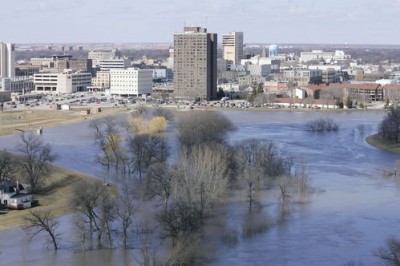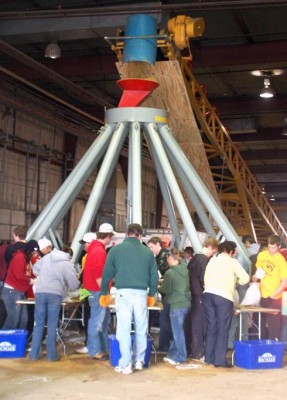As you may be aware, much of the Red River valley here along the North Dakota/Minnesota border is facing a 500 year flood set to peak on Friday. This is not a flood where lives are at risk like the one resulting from Hurricane Katrina. Nonetheless, it is a flood bigger than the 1997 flood that caused serious damage, led to displacement of hundreds of families, and drew national coverage. It is a flood that will require the placement of more than 2 million sandbags in the Fargo-Moorhead area, filled and transformed into dikes by over 10,000 volunteers yesterday alone. As a lifelong East Coaster, I am a stranger to floods. I also currently reside in a downtown apartment building and work on a campus that are both highly unlikely to be affected by flood waters. And, as a sociologist, I’m naturally inclined to view social activity with a particularly distant lens.
is facing a 500 year flood set to peak on Friday. This is not a flood where lives are at risk like the one resulting from Hurricane Katrina. Nonetheless, it is a flood bigger than the 1997 flood that caused serious damage, led to displacement of hundreds of families, and drew national coverage. It is a flood that will require the placement of more than 2 million sandbags in the Fargo-Moorhead area, filled and transformed into dikes by over 10,000 volunteers yesterday alone. As a lifelong East Coaster, I am a stranger to floods. I also currently reside in a downtown apartment building and work on a campus that are both highly unlikely to be affected by flood waters. And, as a sociologist, I’m naturally inclined to view social activity with a particularly distant lens.
So, here are a loose collection of my observations:
-My employer, Concordia College, canceled classes yesterday and today not because of any risk, but simply so that students and staff could help with the flood preparation. Moreover, the administration sent out a message on Saturday saying that all students were expected to show up at 9 am on Sunday to volunteer. Now, I’m very impressed with Concordia’s great expectations for their students, but, frankly, I’m stunned. I have great pride in my alma mater, but I know they would never, ever say that they expected (encouraged, maybe) students to do anything on a weekend –nevermind the intense manual labor of sandbagging and dike-building. I’ve been considering what might explain the difference between the two and find it difficult to say. Is it a Midwestern thing? Is it a social capital thing derived from Concordia’s status as a relatively homogeneous, Lutheran-affiliated school? Is it because Skidmore students tend to have a higher class status and approach college with a consumer model?
-The organization of sandbagging is remarkable. They have developed Sandbag Central (pictured here), 
-The rhetoric of the flood and dike-building is fascinating. Though no human life is at risk, during the entire week leading up to the flood, residents have anticipated it with immense fear and growing panic. I would dare say that some of my fellow volunteers even got a pleasurable rush from the emergency scenario. On my first shuttle bus, I was seated next to a bunch of college guys (not Concordia students!) who had done shots of Jager before showing up to build dikes and had no shortage of homophobic puns about the activity. At the actual dike-building site, there was no expert or official clearly in charge, so there was hyper-masculine jostling for a leadership role. Volunteers got into minor squabbles about the proper method of laying sandbags, engaged in unnecessary demonstrations of manly strength, and attempted to out-veteran each other (“You may have been here for 1997, but let me tell you, I was here for the ’73 flood”). There was also an overwhelming sentiment that real success was achieved by common folks, not by the government. “This is how houses get saved, not by the government spending money — and that’s all they know how to do.” By contrast, I think in a similar situation in New York City, there would be much greater trust in the government, but also a sense of entitlement that it was the responsibility of the government to protect us.
-Though I can’t say I enjoyed the presence of my fellow volunteers, the strength of the community and the willingness to help unseen strangers was very inspiring. And it hearkens back to a sort of society that Robert Putnam claims died off half a century ago.

Comments 6
max — March 24, 2009
I had family that onece lived in the Fargo Minneosota area and i completpley understand what the familiies in this area are going throgh. About this time of year the snow is beggging into melt which causes havoc to the residents living by the river. What the community is accomplishing by working together is a remarkable feat and hopefully this years ordeal will not be as serious as once expected.
jose — March 24, 2009
"I would dare say that some of my fellow volunteers even got a pleasurable rush from the emergency scenario."
We screened a great film here last night called "Silhouette City" about the growth of the Christian dominion movement. In it they talk about the psychological appeal of apocalyptic thinking. It's a powerful marker of solidarity (you are among the chosen and will be purified). Not sure it applies here, but your post made me think about it.
ellemac — March 27, 2009
"Moreover, the administration sent out a message on Saturday saying that all students were expected to show up at 9 am on Sunday to volunteer."
I think it's great that Concordia couches their encouragement of community involvement in language that suggests a higher standard for its students. Obviously they can't enforce such an expectation, but it sends out a message that personal responsibility and community engagement is not just a "nice to have".
For sure, the melodrama and heightened immediacy of "apocalyptic thinking" is alluring. I think one of the appeals, at least in these post-modern times, is it allows individuals to cast off their detachment and experience their innate connectivity to others in ways they don't know how to access or are just too lazy to seek out.
I guess it could be a Midwestern thing. But I think it has more to do with the collective response to disaster. Didn't all of New York City become a collective after 9/11?
andrew m. lindner — March 27, 2009
You're right that it's post-modern way of giving us an "It's a Wonderful Life" feeling of community and validation.
I don't mean to impugn New York's capacity for collective response. In fact, despite its incredible masses of people, it has real strength of community and identity (e.g., every New Yorker knows what it means to be a New Yorker). Nonetheless, the response to 9/11 was to donate blood, to give money to charity, and to be supportive of those who had lost family members. The burden of restoration was largely left to the government.
Yesterday, working at Sandbag Central, we notice a college student volunteer operating heavy machinery. My wife commented that he would never, ever be allowed to do that in NY. In fact, citizens wouldn't be let anywhere near where the city was getting things ready. It's just a different perspective on whether the burden for community functions should be placed on the government or with civil society.
russrunner — March 31, 2009
I currently am teaching a course on communication and disaster and have been closely following the situation in Fargo and Moorhead (our former provost is serving as president of Concordia). My course was inspired by Hurricane Katrina, which trapped my then-80-year-old father in his attic in New Orleans. I understand the amazement with you view the collective/highly socially capitalized response to the looming flood.
Coming from a more urbanized cosmopolitan environment in Philadelphia, you tend to see people lacking trust and socialized to avoid contact. However, as ellemac pointed out so correctly, people responded to 9/11 in jaded New York quite collectively.
While the media coverage of the stranded survivors in post-Katrina New Orleans may suggest a stark contrast from the Red River communities banding together, that would be an unfounded conclusion to reach. People in New Orleans also responded to help each, despite the much more diverse population there. As a matter of fact, my father was "rescued" when emerged from his attic after two days and night by other neighbors. He was clothed, shod, and fed by neighbors in his predominantly African American neighborhood.
I would refer you to an illuminating documentary about Katrina survivors, Trouble the Waters. It illustrates working-class folks coming together during and after the storm and looking out for each other. Returning to North Dakota and Minnesota, I refer you to an excellent study by Alice Fothergill on the previous Red River flood in 1997, Heads Above Water: Gender, Class and Family in the Grand Forks Flood (2004). It takes a previously unprecedented gender and family approach to studying disaster and is quite helpful in understanding that disaster can best be understood as a social phenomenon affecting diverse population segments according to their position in the social structure and corresponding vulnerability.
Riley — May 18, 2010
I totally agree with your opinion about the community. I helped sandbag for 12 hours a day for 4 days straight, and most people would expect constant complaining, but it is actually the opposite. During the time I helped sandbag it felt more like a neighborhood BBQ, rather then a race to save the community, and for me it was actually fun. I also agree on the whole government spending thing. When ever I looked around I always saw the National Guard, and FEMA people standing there and watching us do all the work, and that's the way it is almost everywhere in the United States... All these promises, but none of them are kept. We left the government in charge of the Flood Diversion... So far all they have done is debate about what state it should be put in... Either way the next 500 year flood would still crest at 46ft with the aid of the Diversion... So build one on both sides, and quit wasting time fighting about it.